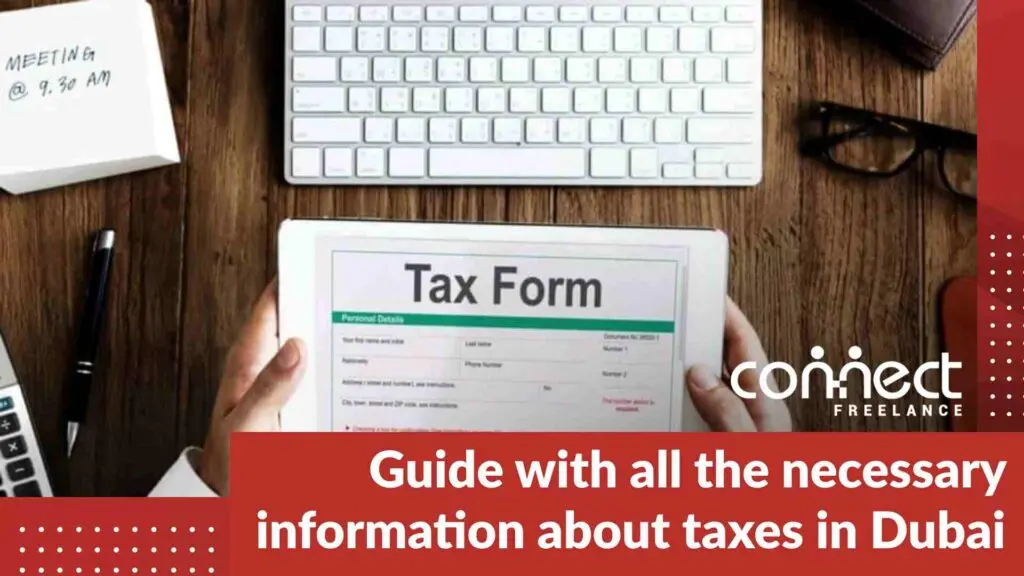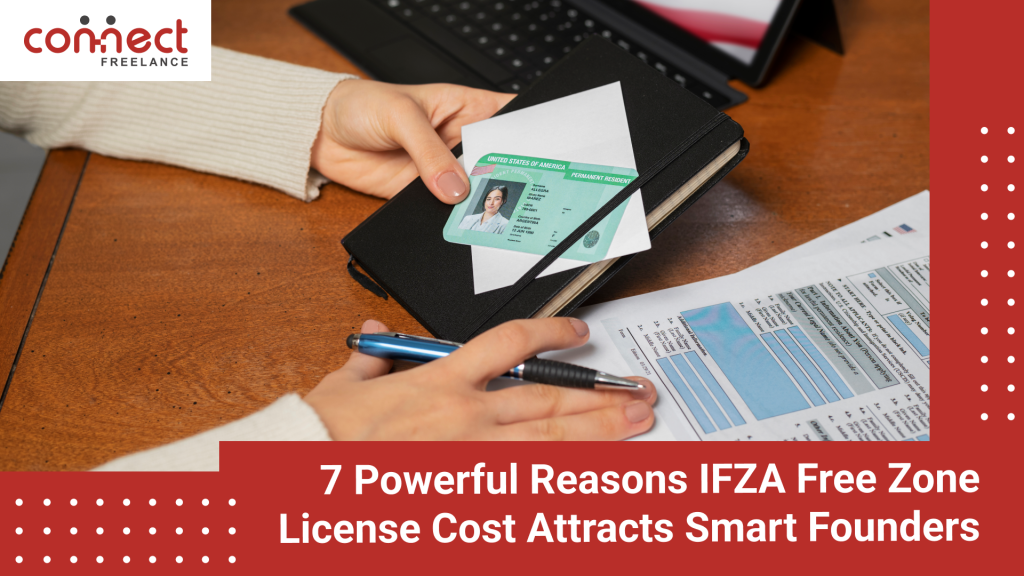There are no obligations for the residents in Dubai, UAE to pay personal income taxes, Therefore one need not have file for any sort of tax registration. For companies, 9% corporate tax will be applied from June 2023 for income earned above AED 375000 or $102096.52.
In all countries of the world, there are policies related to the payment of taxes. These are going to vary depending on which nation you are in, but certain things hold universally. For instance, when we talk about taxes in Dubai or taxes in UAE; They vary in cost depending on whether you are a natural person or if you are a company. Like the waivers, certain policies are sure to be universally repeated.
In this article, you will see all the information that may interest you about taxes in the UAE. The first thing will be that you learn the different taxes that individuals have to pay and their rates. Secondly, we will give you a tutorial on how people can become tax residents. In addition, you will see all the taxes that companies must pay.
- Do you know the taxes you must pay as an individual in Dubai?
- Learn how people become tax residents
- Do you know the taxes that companies must pay in the UAE?
- What are the tax exemptions for companies in the UAE?
- Step-by-step guide for a company to obtain its tax residence in Dubai
1. Do you know the taxes you must pay as an individual in Dubai?
If you want to immigrate to Dubai, or planning to move to Dubai, You need to understand and become aware of the Tax regulation of system in the country.
There is no income tax in Dubai, it is important to know how much money you need to live in Dubai. This is in consequence of Dubai offering many saving facilities. This is caused by the policies that residents should not pay a Dubai income tax. However, it is important to note that there is no federal law in the UAE that specifies the Dubai minimum wage.
In this way, there are very frequent questions about whether Does Dubai has taxes. As previously stated, residents and citizens are exempt from many taxes. However, there are other types of taxes in Dubai that must be paid. Next, we will be able to answer the question of whether you pay tax in Dubai.
1.1 The tourist taxes in Dubai
Foreign people pay taxes in UAE on hotels, restaurants, and resorts. In addition, different taxes and fees are included in the invoice(which is basically indirect tax). We can find among hotel taxes that is 10%, the municipal tax that goes from 0 to 10%, and the city tax that goes from 6 to 10%. On the other hand, there is a service fee that is 10% and a tourist tax that is 6%.
Tax rates change according to which emirate you are in. An example of this is that in Dubai the municipal tax is 7%, while in Ajman or Sharjah it is 10%. However, in Ras Al Khaimah this tax is not collected. The most popular emirate is Dubai, with 5.1 million tourists in the first quarter of 2022.
When staying in a hotel in Dubai, tourists must pay an additional fee called tourist dirham. This rate is priced between AED 7 and AED 20 per night, depending on the category of your room and the stars of the hotel. The rate per night in the one-bedroom room of the 4-star hotel has a value of 15 AED.
If people are staying in a 5-star hotel, the rate will be 20 AED. When having two bedrooms, this will be charged twice. However, this fee will only be paid during the first 30 days that you stay at the hotel.
2. Guide for obtaining tax residence certificate to avoid double taxation
Many visas in Dubai allow you to obtain your residence, an example of this is the Dubai working visa. It is important that you have one of the visas that Dubai offers, as foreigners with residence visas automatically become tax residents. In this way, they don’t have to obtain your tax identification number to do that.
If you want to avoid double taxation and your home country has a double tax treaty with the UAE; you will need to obtain a tax residence certificate. If you want to confirm your tax status, you will need to do the following:
- You will need to obtain a residence visa, therefore you should be up to date with the new employment visa rules of 2023 which will help you. In addition, you must live in the UAE for at least 180 days.
- You will have to rent or buy a property in the UAE.
- Finally, you must fill out an application before the FTA or Federal Tax Authority.
2.1 What are the necessary documents to obtain the tax residence certificate?
To obtain this certificate it is important that you have the following documents:
- A copy of the passport.
- A copy of the UAE residence visa.
- Confirmation of your income, such as your pay stub or pension.
- A copy of your long-term rental agreement or a copy of the property purchase agreement.
- A bank account statement in the UAE for the last 6 months.
- Confirmation that the person applying for this certificate has resided in the UAE for at least 180 days. This is obtained at the Federal Directorate of Identity and Citizenship or the General Directorate of Residence and Immigration.
When completing the FTA application, the applicant must specify the country for which they want to obtain a Tax Residence Certificate. In addition, you will need to choose a start date for a fiscal year, attach copies of documents, and pay the application fee of AED 1,000.
This certificate will be issued in the next 3 days. In addition, you can download it from the website together with the tax identification number that is automatically obtained. Both the tax identification number and the tax residence certificate are enough to confirm the status of a tax resident of the UAE in any country.
3. Do you know the taxes that companies must pay in the UAE?
The United Arab Emirates corporate tax rate will be introduced in June 2023 and will have a rate of 9%. This rate will be applied to those companies that earn more than AED 375,000 or USD 102,000 per year. Until the time comes, the corporate tax for most companies will remain at 0%.
Those foreign companies in the gas and oil sector pay 55% of the corporate tax. All branches of foreign banks pay 20%. Capital gains and dividends are not taxed, as are reorganizations and intragroup transactions.
VAT, or Value Added Tax, is 5% in the UAE. VAT must be paid on a mandatory basis if the obtained Dubai income is more than 375,000 AED or 102,000 USD per year. To be able to pay the tax, the company will need to register as a VAT payer in the TLC. Companies that earn between 187,500 and 375,000 a year do not need to register mandatorily.
VAT is generally paid quarterly within 28 days after the end of the tax period. However, the federal tax authority may appoint different tax periods for particular taxpayers.
3.1 The excise tax in Dubai
This applies to those products that the government considers bad for human health or the environment. It is calculated according to the percentage of the sale price to the public less excise tax and VAT; or the price of the FTA-designated product, whichever is higher.
The list of products and their tax rates can be seen below:
- 50% off all soft drinks, except plain soft drinks. In addition, for all those products that contain sweeteners or sugar.
- 100% for all tobacco products, energy drinks, and all electrical smoking devices.
The companies that import, store, or manufacture products that comply with the aforementioned, must pay the excise tax. In addition, companies must register with the FTA so that they are reflected as excise taxpayers. The tax is paid quarterly within 15 days after the end of the tax period.
3.2 Export and import taxes
For importation, the tax may change depending on the nature of the goods being imported. However, this is often 5% of the cost, freight, and insurance value of imports.
We can find that certain harmful products such as tobacco or alcohol are imported with a tax of 50 to 100%. On the other hand, most of the national products of the great Arab free trade zone are imported without any tax.
Goods that are imported into free zones are also exempt from import tax until they are transferred to the local market. It is important to know that the tax if you want to export any product, is 0%.
4. What are the tax exemptions for companies in the UAE?
All entrepreneurs and investors register their companies in the UAE to minimize their tax burden. The most favorable conditions for companies are found in free zones. This happens as a result of having special tax and customs regimes.
Below we will be able to observe which are the benefits that a free zone grants to the companies that establish themselves in them:
- They will not have corporate taxes from 15 to 50 years after the registration of the company.
- They will not need to pay VAT.
- All income generated by the international business of individuals and companies; will not be taxed in the UAE and can be freely withdrawn from bank accounts.
- They will not have personalized rates.
- Investors may also be the sole owners of a business. Unlike having to find a local partner and having to give him 51% of the total shares of the company when registering your business outside these free zones.
There are currently 45 free zones in the UAE and counting. Most of these areas are in Dubai, making it a very attractive location if you need to start a new business.
5. Step-by-step guide for a company to obtain its tax residence in Dubai
Being a company registered in the UAE, it is automatically considered a tax resident. However, applying for a tax residence certificate can only be done one year after registration. The certificate is necessary so that the tax residence of the UAE in other countries can be confirmed and avoid double taxation from happening.
The founders will need to fill out an application with the TLC and the company registration fee is 1750 AED. To request the tax residence certificate, collect the aforementioned documents. When completing the application, you must specify the country for which you wish to obtain the certificate and thus choose the start date for a fiscal year.
We can find that starting a business in Dubai can be very beneficial and more if we start in a free zone. If you want to know more about the benefits of starting your working life in Dubai, visit our blog. In this way, you will know everything you need about taxes in Dubai and any relevant information on this topic. In addition, we offer you all the necessary services so that you can apply for a freelance visa and be successful in the process.
6. Securing a Freelance Visa could be the best option for you
Taking up Freelance Visa will allow an individual to live and work in the UAE, There are many freelancers who take up multiple projects and make a lot of money, The best thing is that all the income which are earned becomes nontaxable in UAE since there is no tax levied on individuals on personal income. Moreover, the individual can not only pocket all the earnings, but they can also embrace the luxurious life in Dubai. That is the best part of taking up Freelance Visa.
Thanks to all the opportunities offered by the Middle East and Dubai, these are positioned as one of the best work alternatives. However, sometimes people do not know how to find information on this topic. For this reason, they must visit The Talent Point. Here you will find different job offers that can be adapted to your wishes. If you want to contact The Talent Point you can do so through their email [email protected].
Author
-
Mehvish Beg is a dynamic and results-oriented Business Development Executive with a passion for driving growth and building strategic partnerships. With a keen understanding of market trends and customer needs, Mehvish excels in identifying new business opportunities and forging strong relationships with clients and stakeholders. With a proven track record of exceeding targets and delivering innovative solutions, Mehvish is dedicated to driving revenue growth and expanding market presence.
View all posts





